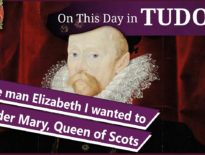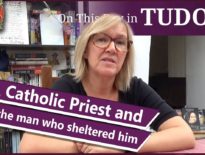On this day in Tudor history, 25th September 1525, explorer, navigator and naval administrator Stephen Borough (Burrough) was born at Borough House, Northam Burrows, Northam, in Devon.
This Arctic explorer learnt his navigational skills from first his uncle and then Spanish pilots in Seville. He discovered Novaya Zemlya and the Viagatz Strait (Kara Strait), which was named the Burrough Strait until the late 1800s.
Hear an overview of Stephen Borough's life and career in today's talk.
Also on this day in Tudor history, 25th September 1534, Pope Clement VII (Giulio di Giuliano de' Medici) died in Rome. It was rumoured that he died from eating death cap mushrooms or from fumes from poisoned candles placed in his room. Find out more about the pope and the rumours surrounding his death, plus what eating a death cap mushroom does to you, in last year’s video:
Also on this day in history:
- 1513 - Vasco Núñez de Balboa, the Spanish explorer, reached the Pacific Ocean. He was the first European to have discovered the Pacific Ocean from the New World.
- 1554 – Death of Richard Sampson, Bishop of Coventry and Lichfield, and former President of the Council of the Welsh Marches, at Eccleshall in Staffordshire. He was buried in the parish church at Eccleshall. Sampson had acted as the King's Proctor at the fall of Anne Boleyn in 1536.
- 1555 – The Peace of Augsburg, or Augsburg Settlement, was signed by Charles V, Holy Roman Emperor, and the princes of the Schmalkaldic League at Augsburg.
- 1558 – Gertrude Courtenay, Marchioness of Exeter, made her will. She died soon after and was buried in Wimborne Minster, Dorset. Gertrude was the mother of Edward Courtenay, 1st Earl of Devon, who was imprisoned for his part in Wyatt's Rebellion in 1554. Gertrude, herself, was imprisoned in 1538, and her husband was executed for treason.
- 1584 – Death of Thomas Copley, Roman Catholic, in exile near Antwerp. He had served Elizabeth I as Commissioner of the Peace for Surrey, and she was godmother to his son, Henry, but he lost royal favour when he converted to Catholicism in 1563. He left England in 1570, being unable to accept royal supremacy and Elizabeth I's religious measures.
- 1586 – Mary, Queen of Scots was moved to Fotheringhay Castle in Northamptonshire, and Elizabeth finally backed down and agreed to the appointing of 36 commissioners to act as judges in her trial.
- 1594 – Death of Gregory Fiennes, 10th Baron Dacre, at Chelsea. He was buried in Chelsea Old Church.
- 1602 – Death of William Redman, Bishop of Norwich, at the Episcopal Palace. He was buried in the cathedral choir.
Transcript:
On this day in Tudor history, 25th September 1525, explorer, navigator and naval administrator Stephen Borough was born at Borough House, Northam Burrows, Northam in Devon. He was the son of Walter Borough and his wife Mary Dough.
In his childhood, Borough was influenced by his uncle, the seaman John Borough, and probably helped him with his first measured coastal surveys of south Devon and Cornwall in 1538. His uncle taught him navigational skills, sailing skills, Spanish and Portuguese.
In 1553, Borough served as master of the Edward Bonaventure, in a fleet of three ships, on a voyage to look for a northern passage to Cathay and India. Bad weather meant that only Borough's ship got through to St Nicholas (Archangel). Borough undertook a second voyage in 1556 in the Serchthrift and discovered Novaya Zemlya and the Viagatz Strait (Kara Strait), which was named the Burrough Strait until the late 1800s.
In 1558, Borough travelled to Seville, in Spain, to trade his knowledge of the Arctic for navigational training from Spanish pilots. On his return to England, Borough had Martin Cortés' manual Breve compendio del arte de navegar translated by Richard Eden and published for use by English seamen as The Art of Navigation.
In the early 1560s, Borough traded in the Arctic as chief pilot of the Swallow, but in 1564 became one of four keepers of Elizabeth I's ships on the Medway and settled at Chatham. He was made Master of Trinity House in 1572 and died in Chatham in 1584.
Borough's younger brother William was also an explorer and naval administrator. He was appointed Comptroller of the Navy in 1580. In 1581, he published A Discourse on the Variation of the Compasse.
Stephen Borough also had a son Christopher who was a merchant, adventurer, navigator, translator and chronicler. “Aduertisements and reports of the 6th voyage into the parts of Persia and Media for the Company of Merchants for the discouerie of new trades, in the yeares 1579, 80, and 81, gathered out of sundrie letters written by Christopher Burrough, servant to the saide companie, and sent to his uncle, Master William Burrough” was his account of his voyage to Persia.



Leave a Reply